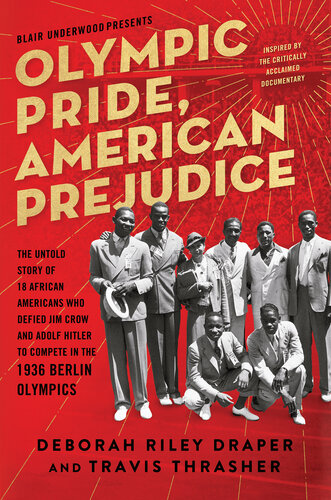
Olympic Pride, American Prejudice
The Untold Story of 18 African Americans Who Defied Jim Crow and Adolf Hitler to Compete in the 1936 Berlin Olympics
کتاب های مرتبط
- اطلاعات
- نقد و بررسی
- دیدگاه کاربران
نقد و بررسی

December 9, 2019
Filmmaker Draper, director of Versailles ’73, and Thrasher (Solitary) offer a stirring companion to the eponymous 2016 documentary about the 18 African-American athletes who competed for the U.S. at the 1936 Olympic Games in Berlin. While Jesse Owens is the best-known name, this work is “the story of the others” who faced prejudice in both Germany and in Jim Crow America, many of whom later served in WWII. The book charts the backgrounds and lives of athletes such as hurdler Tidye Pickett, who won races as an eight-year-old girl in Chicago, and James LuValle, who won medals at the Olympics and later became a celebrated chemist. The narrative builds to the games themselves, with gripping descriptions of the races and an account of how athletes including Dave Albritton, Cornelius Johnson, and Delos Thurber refused to give the Nazi salute in front of Hitler, instead extending “their wrists turned upward and their thumbs slightly cocked down.” Cutting across disciplines, this stirring remembrance of athletes who have long been overshadowed will resonate with anyone interested in the Olympics or the history of civil rights.

December 6, 2019
In 1936, Jesse Owens participated in the Berlin Olympic Games, making history by winning four Olympic Gold Medals. Here, documentary filmmaker Riley collaborates with Travis Thrasher (American Omens) and author and actor Blair Underwood to tell the story of other African American athletes who participated in the 1936 Olympic games alongside Owens. This important historical book is a companion to the documentary of the same name released in 2016. For a number of the athletes, the authors start by telling their stories beginning in childhood. This can be confusing as the story is told chronologically and jumps from athlete to athlete in a certain part of his or her life and then circles back to an earlier time. The amount of research, however, that went into both projects is impressive, presenting details about how conflicted some athletes were on boycotting the games. VERDICT Even though the organization of the book could have been improved, overall it will appeal to readers interested in the history of the Olympics and World War II and might best serve as a companion piece to the documentary. --Pamela Calfo, Bridgeville P.L., PA
Copyright 2019 Library Journal, LLC Used with permission.

December 15, 2019
Jesse Owens wasn't the only black athlete who excelled at the 1936 Berlin Olympics. This group portrait honors the others who helped prove Hitler wrong about white superiority in sports. Eighteen African American athletes--16 men and 2 women--competed at the Berlin Olympics, all overshadowed by Owens' spectacular victories. Without neglecting the star runner and long jumper, this companion to a 2016 movie celebrates the other black members of the American team, most of whom competed in track and field events. As director Draper and veteran author Thrasher (American Omens: The Coming Fight for Faith: A Novel, 2019, etc.) show, many had overcome towering obstacles, including poverty, segregation, and pressure from black newspapers to boycott the Olympics. Whatever their challenges, the 17 lesser-known athletes stayed focused in Berlin, won 10 medals in addition to Owens' four golds, and helped lay to rest Hitler's myth of Aryan supremacy in sports. The authors describe competitors like 400-meter dash gold medalist Archie Williams in undemanding, present-tense prose well suited to a young adult audience: "Archie knows going back to school is a good thing. He will be bettering himself and not sitting around the house and getting into trouble." This approach will hearten booksellers and librarians looking for inspiring, easy-to-read sports books for teenagers, but adult readers may be put off by oversimplified characterizations of Hitler and others: "The Nazi leader has no desire to race or compete. His idea of competition is to defeat his enemies or to make sure they can never line up against him in the first place." Anyone seeking more complex nonfiction about U.S. athletes' challenges in Berlin will find it in Daniel James Brown's bestselling The Boys in the Boat or Andrew Maraniss' recent young adult book Games of Deception. A decent meal for sports-loving teenagers looking for role models but a thin soup for adults.
COPYRIGHT(2019) Kirkus Reviews, ALL RIGHTS RESERVED.

January 1, 2020
The most recognizable name of any athlete who competed in the 1936 Berlin Olympics is, of course, American Jesse Owens, who won four gold medals that summer. In this companion to award-winning filmmaker Deborah Riley Draper's 2016 documentary with the same title, the authors draw from the extensive interviews and research to further highlight the compelling life stories of the other African Americans (15 men and 2 women) who, with Owens, competed for the U.S. in those historic games. In profiling these trailblazing athletes, the authors recount how they overcame poverty and detail their encounters with racism in the Jim Crow South, as well documenting their careers as collegiate athletes. Of note are the sections that tell the parallel story line of the rise of Adolf Hitler and the Third Reich. This is an easy-to-read book, including historical photos, that shines a welcome light on lesser-known Olympians, all of them Black sports heroes who paved the way for future civil-rights gains. Certain to have broad appeal for track-and-field fans as well as readers interested in the history of African Americans in sports.(Reprinted with permission of Booklist, copyright 2020, American Library Association.)

























دیدگاه کاربران